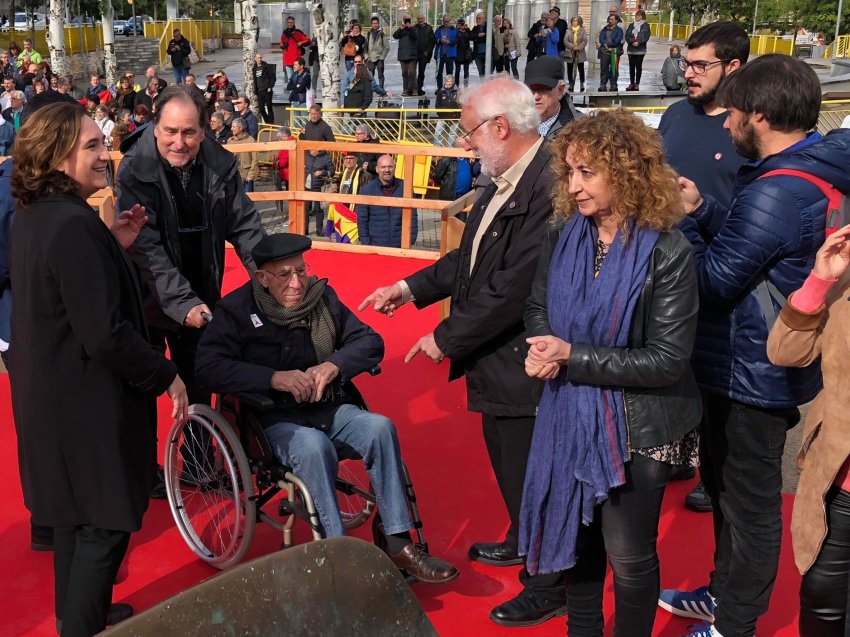
On the northern outskirts of Barcelona, on La Rambla de Carmel, stands one of the most visually striking and symbolic monuments to the volunteers of the Abraham Lincoln Brigade of the International Brigades.
“David and Goliath”, designed by US sculptor Roy Shifrin and first unveiled in 1988, was the most prominent gathering point for the 80th anniversary of the departure of the International Brigades — anti-fascists who had come from around the world to fight against Francisco Franco’s forces — from Barcelona on October 28.
Organised by the Association of the Friends of the International Brigades (AABI) with the support of both the Barcelona City Council and the Catalan regional government, the events in remembrance of the departure of the volunteers took place over October 25-28 across Catalonia.
On October 25, a rally was held in the town of l’Espluga de Francolí, north of Tarragona to remember one of the final farewell acts for the 2000 international volunteers that marched through the town on their way to Barcelona, exactly 80 years earlier.
The next day, a series of seminars were held at the Universitat de Barcelona with debates and discussions focusing on some of the forgotten volunteers, their legacy in their countries of origin and their significance in the contemporary anti-racist and feminist struggles.
Among the panellists were Vjeran Pavlaković, a researcher with a focus on the volunteers from the former Yugoslavia. Pavlaković highlighted the experience received by the volunteers (among them later Yugoslav leader Josip Broz Tito) during their fight against fascism and its significance for the future resistance against both the Italian and the Nazi occupation of the country.
Rocio Velasco de Castro presented the previously unknown case of Arab volunteers who fought on the side of the Republic. The most prominent was Palestinian Muhammad Nayati Sidqi, who was actively involved in organising anti-fascist propaganda and persuading the Moroccan soldiers of Franco’s armies to join the Republican cause.
The forums were accompanied by an exhibition organised by the university and displaying the memorabilia, art and literature about the International Brigades from across the world.
October 27 was marked with a visit and gathering at Fosal de La Pedrera in the south-east of Barcelona, the site of one of the most well-known Civil War-era mass graves in Catalonia.
The act of remembrance honoured the participation of the Austrian, German and Jewish international volunteers, as well as the many victims of the Francoist and Nazi dictatorships, most prominently Lluís Companys, the president of Catalonia during the war who was executed by the Gestapo in 1940.
On October 28, the final day of the commemorations, Barcelona City Council organised a cultural event at la Rambla del Carmel, with participation of Barcelona Mayor Ada Colau, composer Xavier Albertí, musician Paco Ibáñez, actress Mercè Arànega, US academic and representative of the Abraham Lincoln Brigade Association in Europe, Robert Coale, and Almudena Ros, head of AABI, among others.
Colau recalled the bravery of the volunteers as an example for confronting and resisting the modern-day far right and fighting for democratic alternatives. She also added that in her work, she would “continue building a Republican and anti-fascist Barcelona”.
Coale gave an eulogy remembering the 2000 volunteers from the US, a third of whom died in Spain. Many later took part in both the landings in Normandy and the liberation of Paris, creating the historical connection between the anti-fascist struggle in Spain and that of World War II.
Ros acknowledged the surviving members of the international brigades from across the world — the brothers Almudéver, Geoffrey Servante in England, Virgilio Fernandez de Real in Mexico, as well the veterans of the Spanish Republican forces such as Luis Martín Bielsa.
Ros called on attendees to “pick up their torch and continue that journey against fascism and capitalism”, particularly in the context of the rise of the far-right and fascist forces across the world.
The final act of remembrance took place at the foot of the “David and Goliath” statue, with a joint laying of the wreaths by Colau, members of AABI and family members and descendants of the volunteers. Hundreds of participants paid their respects to the memory of the fallen.
The mass participation further signified both the ongoing interest in preserving the memory of the International Brigades and the desire for left and progressive political forces to openly embrace and promote their legacy.